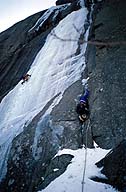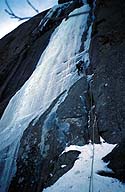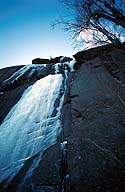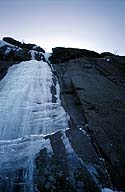
My youth was full of tales of knights who, centuries ago, slew dragons in the name of love, glory, and God. The lonely speckle of the shining armor moved forward even as fear engulfed him. As the duel began, a wind of fire submerged our hero in a kiss of death. Thrusting shield ahead, he blindly slashed the air in search of the beast, his panic forgotten in a fight for survival. In those tales the hero never died. Triumphant, he rode his horse back to the safety of the castle where he joined in the company of fellow knights until death called again. I envisioned them sitting by a fire, drinking, eating, laughing, and sharpening their tools prior to dawn's call to battle. For those men their purpose was clear, their brotherhood comforted them, and the world outside seemed as mysterious and inhospitable as the dragons themselves.
As I grew older, I was indoctrinated in the numbers game and dedicated a decade and a half to the search for elusive distinction in the academic world. I betrayed many and was betrayed by a few others. As brother was murdered, a dollar in my pocket became my friend. Love proved disposable, and the dream of parenthood was forgotten, as a dog became my child. When at last, I had extirpated from my life all who cared for me, prescriptions consoled me and cynicism became my lover. In pursuit of another way to spend my disposable income, I came across a group of men for whom the rules of adulthood did not apply. The source or frequency of earnings did not torment them and for these men, the comfort of a woman was optional. Numbers were few, but most important, they were meaningless. Their worth was based on the love they felt for each other and for the game. In the place where they gathered, money, titles, and social status were of no use and as they sat by the fire, ate, drank, and laughed, time had no meaning and serenity was ubiquitous.
At the Bivouac two rules are enforced – "Keep the door closed" and "There are no rules." Social niceties are simple: bring beers for all when you get your own, do not impose tobacco products on others, and fill the wood stove once per visit. Newcomers are brought one at time, and their behavior is the responsibility of those who bring them. The nights are filled with stories, the aroma of cannabis mixed with poor personal hygiene, and the sound of ice tools being sharpened. Women who do not seek to shape the behavior of this rendezvous bunch are welcomed and dogs are treated like anyone else.
With the swing of an alpine tool, the dragon finally awoke. Forty pounds of ice came crashing onto my face almost knocking me off the climb. Hanging from one tool, I slowly regained consciousness as blood poured from my left eye. As retreating was not practical, my only option was up. Trying to continue, I scanned for a tool placement when a golf ball-sized chuck of ice came crashing into my forehead adding insult to injury. My friend Ian, realizing the seriousness of my condition, encouraged me from above; below, Gary readied himself for a running-downhill belay in case both, the Runnel and I came crashing down. Once I regained awareness, I focused more than ever before. My mind diminished the climb to a small sphere of influence, which protected me. A questionably placed nut ran down the rope as I moved past it. Ian continued the encouragement – "Why we do this? Because it is fun..." A few feet higher, a glove flew down and landed on my face. What else could be sent from above? – I wondered. When I reached Ian and the safety of the belay station, I knew that my scholarship had paid off: in slaying this dragon, I had put to rest many of my demons. And that night, when the Bivouac door opened, my brothers cheered for me. In his book The
Little Prince, Antoine
de Saint Exupéry wrote – "Grown-ups never understand
anything by themselves, and it is tiresome for children to be
always and forever explaining things to them." If it has been a
while since you grew up and numbers are important to you, I am sorry
to have bored you with this tale of children trapped in grown men's
bodies. However, for those of you who quietly still believe, know that
there is a land of ice dragons and a brotherhood of ice-climbing
knights waiting for you in the Adirondacks' winter lands.
|
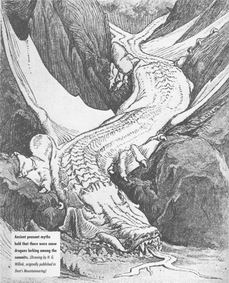
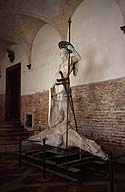

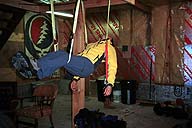
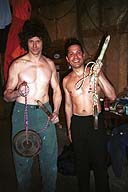

 ne day this past
season, as I went to Poke-O in search of the infamous dragon known as Positive
Thinking, I found few options when various teams of climbers waited
for their turn to test their steel. While time vanished, Gary and
I searched for alternatives and the improbability of The Runnel
turned into the thing to do. The first few moves through a dry
crack were strenuous, but the availability of a piton 20-ft up made
escaping a real possibility. At the piton, the water drip between rock
and ice indicated the clear delamination of the late winter
ice. Carefully, I pressed my crampon front points into the ice sheet
hoping for it to remain integral under my weight. Inch by inch,
I moved up as sweat dripped down my back. The Runnel – no wider than
8 inches anywhere – was mostly delaminated too. For the first time
in that winter, serious injury was a distinct possibility and as I
moved up, I felt the creature creeping under my weight.
ne day this past
season, as I went to Poke-O in search of the infamous dragon known as Positive
Thinking, I found few options when various teams of climbers waited
for their turn to test their steel. While time vanished, Gary and
I searched for alternatives and the improbability of The Runnel
turned into the thing to do. The first few moves through a dry
crack were strenuous, but the availability of a piton 20-ft up made
escaping a real possibility. At the piton, the water drip between rock
and ice indicated the clear delamination of the late winter
ice. Carefully, I pressed my crampon front points into the ice sheet
hoping for it to remain integral under my weight. Inch by inch,
I moved up as sweat dripped down my back. The Runnel – no wider than
8 inches anywhere – was mostly delaminated too. For the first time
in that winter, serious injury was a distinct possibility and as I
moved up, I felt the creature creeping under my weight.